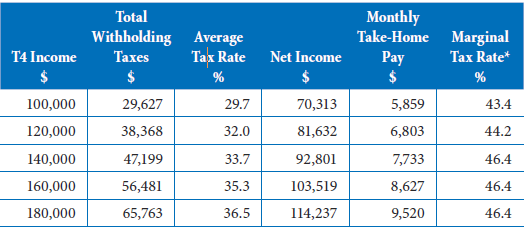Taxation — The Deciding Factor
TAXATION
A six-figure earned income may not have as much
spending power as expected after taxes.
Wages, salaries and all other forms of earned income
have increased dramatically for those with the required
skills who are willing to move to the parts of the country
where such skills are in demand. Indeed, it is not
unusual to see T4s at year end in excess of $100,000.
The satisfaction of earning a six-figure income is
quickly tarnished, however, after the amount of federal
and provincial tax has been calculated.
A $160,000 annual salary income, for instance, is
equal to $13,333 per month. Based on 2013 personal
tax calculations, however, a single person living and
working in Ontario, for example, would pay $56,481
in combined deductions from federal and provincial
income tax, Canada Pension Plan (CPP) and Employment
Insurance (EI).
Effect of Deductions
Given these figures, anyone in Ontario who earns
$160,000 is going to take home $103,519 if salaried. On
a monthly basis, this amounts to $8,627, a far cry from
the $13,333 that appears on the payslip. For those who
earn or aspire to earn in the six-figure range, consider
the tax brackets in the following table.

*The marginal tax rate represents the average additional income tax on the next
$20,000 of income.
It is also important to note that, as marginal tax rates
rise with additional income, there are fewer disposable
dollars left until the maximum marginal rate is reached.
Base spending decisions on disposable
income not gross income.
Gross Income vs. Disposable Income
The realization that gross income must not be construed
as disposable income should be factored into
any spending decisions. Financial decisions should be
calculated on the basis of take-home, i.e., not gross,
income. The following questions should guide any
spending and saving decisions:
- How much are my monthly mortgage payments
and utility bills? - How much does it cost per month to service my
student loans or other debts? - If mortgage rates increase will I be able to meet the
additional cash-flow drain? - What is the price of mortgage insurance?
- How much are my property taxes?
- How much do I spend on rental accommodations,
condominium or common-cost fees? - How much do I need to put aside to accumulate
the 20% down payment on a home? - How much do I spend per month on food, clothing,
repairs and maintenance, entertainment and
other leisure activities? - Should I purchase an expensive vehicle with payments
spread over 84 months? - What is the minimum after-tax dollar requirement
to support my current lifestyle in the event I lose
my job? - How much do I need to put aside to cover a shortterm
layoff? - If I need to borrow for an emergency, will I be able
to pay down the line of credit? - In the event of downsizing, will I be able to quickly
find a new position with the same pay scale? - Is it worth moving to take a new job that pays more?
- In the event I am ill, what is the cost of insurance
to cover the cost of staying in my home? - Can I afford to open an RRSP? What is my contribution
limit? Can I afford to contribute? - What is the cost of medical and dental insurance?
- What is the cost of going to and from the job site?
- Will I be able to help my parents if the need arises?
- Will increased earnings offset increases in the cost
of living? - How long will I continue to earn six figures?
Budget Strategically
“I’ve been rich and I’ve been poor. Believe me, rich is
better.”
This pithy remark, often attributed to Sophie Tucker,
Mae West and others is certainly true, regardless of
who said it first. Earning more is better than earning
less. But the principal factor in determining the
amount of money available for lifestyle expenditure
remains taxation. Those who already have six-figure
incomes should carefully analyze the long-term
impacts of a high debt load, future increases in the cost
of living, and the risk of layoff in order to determine
the best means of managing after-tax income wisely.
Disclaimer
The information provided on this page is intended to provide general information. The information does not take into account your personal situation and is not intended to be used without consultation from accounting and financial professionals. Allan Madan and Madan Chartered Accountant will not be held liable for any problems that arise from the usage of the information provided on this page.


SOCIAL CONNECT